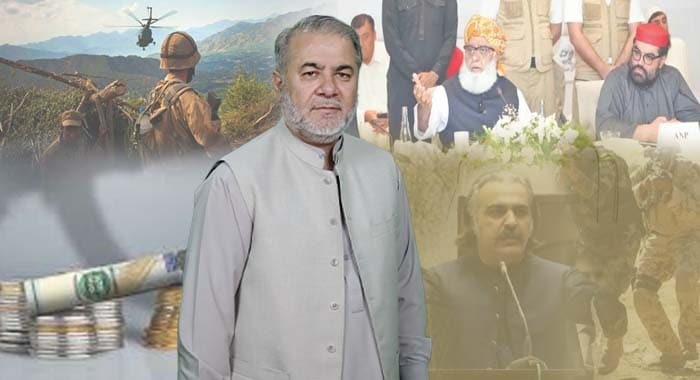The latest All-Party Conference (APC) has once again exposed Pakistan’s greatest weakness: a divided political class unable to rise above self-interest. While terrorism and insecurity continue to cripple Khyber Pakhtunkhwa and Balochistan, our leaders seem more concerned with political point-scoring than genuine solutions.
Political parties across the board admitted that today’s violent instability is the outcome of decades of flawed decisions. For years, sensitive tribal regions bordering Afghanistan remained without proper governance, law enforcement, or land registration. Even after the merger of FATA into Khyber Pakhtunkhwa in 2018, the police struggled to establish authority. Ordinary people in these areas live in fear, often guarding their homes themselves because they cannot rely on the state’s security apparatus.
This reality has created a cycle of fear and lawlessness. Areas near the Afghan border; southern KP, Peshawar’s outskirts, Bajaur, Mohmand, and Khyber, remain hotspots. While cities like Islamabad or Rawalpindi live in relative peace, the people of KP face daily anxiety, illustrating the deep imbalance of security within the country.
The biggest tragedy is that Pakistan’s politicians treat terrorism as a political debate rather than a national emergency. When in opposition, they take one stance; when in government, they adopt the opposite. This opportunism weakens any attempt at a consistent anti-terror policy.
The truth is that every major party has been in government at some point. Each bears responsibility for the failure to act decisively. Yet, instead of acknowledging mistakes and building consensus, leaders prefer blame games. This shortsightedness has prevented the creation of a long-term strategy to deal with extremism.
Military operations have played a key role in reducing the power of militant groups, but they have never been a complete solution. In the past, while soldiers sacrificed their lives, some political parties launched propaganda claiming that these were “America’s wars.” Funerals of martyrs were politicized, and public trust was eroded.
Today, the U.S. is gone from Afghanistan, but terrorism has not disappeared, it has intensified. This fact alone proves that the war is Pakistan’s own. Bombs and guns may suppress terrorists temporarily, but they cannot eliminate extremism unless politics, society, and state institutions move together with one voice.
Maulana Fazl-ur-Rehman’s statement, that 10% of KP’s development budget ends up in terrorism, sparked heated discussion. But many view it as politically motivated. In recent years, the Maulana has lost significant influence in his hometown of D.I. Khan, especially after the rise of rivals like Ali Amin Gandapur. His critics accuse him of being soft on the Taliban, avoiding strong condemnation, and now using accusations of “terror funding” as a political weapon.
Unless backed with verifiable evidence, such claims damage national unity rather than strengthen the fight against extremism. Pakistan needs clarity, not vague accusations.
Another pressing issue raised at the APC was the fate of Afghan refugees. Pakistan has hosted millions for over four decades. Now, the state is sending them back in phases—undocumented migrants first, then Afghan citizen card holders, and finally PR card holders.
But this policy lacks vision. Three generations of Afghans have been born on Pakistani soil, with no citizenship or representation. Many consider Pakistan their only home. Forced repatriation without coordination or humanitarian planning risks not only worsening relations with Kabul but also fueling resentment that extremists could exploit.
History is full of APCs that produced eloquent speeches but no follow-up. Excellent suggestions were put forward in this latest conference as well; calls for unity, joint policy, and national strategy. Yet, based on past experience, the chances of implementation remain slim.
The reason is clear: government parties rarely take APC demands seriously. Opposition parties use them to score points, while ruling parties see them as a burden. Without genuine political will, APCs will continue to be platforms for dialogue without results.
Pakistan’s survival depends on a simple truth: terrorism cannot be defeated without national unity. Military strength must be combined with political consensus, public trust, and strong governance. Leaders must rise above party differences and recognize that terrorism threatens all equally.
If unity is achieved, peace will bring investment, jobs, and stability. People will stay in their homeland rather than flee in fear. But if leaders continue to play politics, the people of Khyber Pakhtunkhwa and Balochistan will remain trapped in insecurity, while the rest of the country lives in denial.





